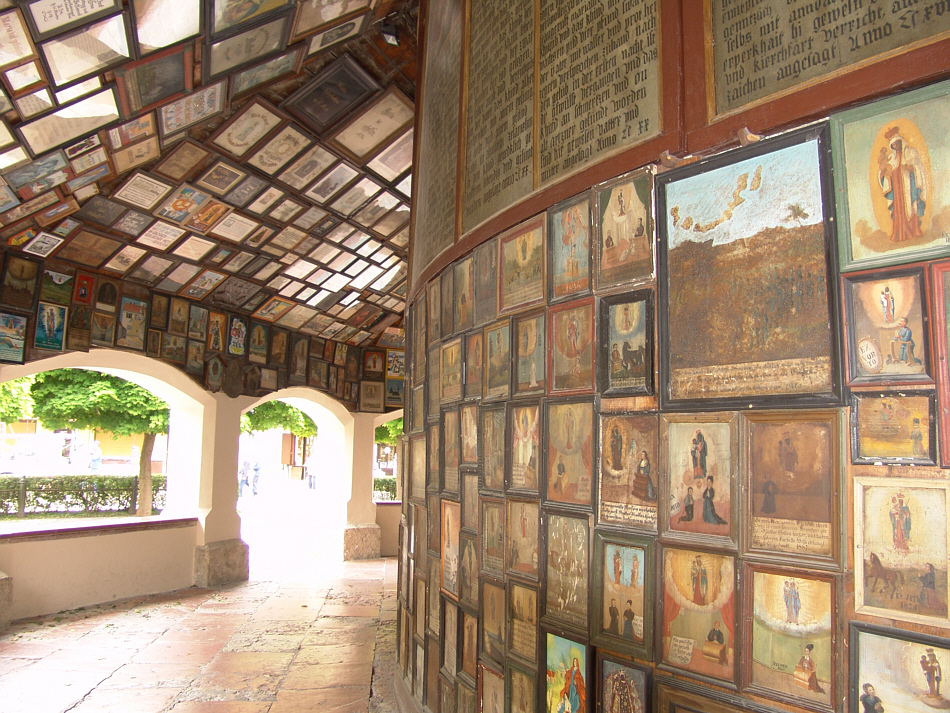|
Pilgrimages
A pilgrimage is a journey, often into an unknown or foreign place, where a person goes in search of new or expanded meaning about their self, others, nature, or a higher good, through the experience. It can lead to a personal transformation, after which the pilgrim returns to their daily life. Background Pilgrimages frequently involve a journey or search of moral or spiritual significance. Typically, it is a journey to a shrine or other location of importance to a person's beliefs and faith, although sometimes it can be a metaphorical journey into someone's own beliefs. Many religions attach spiritual importance to particular places: the place of birth or death of founders or saints, or to the place of their "calling" or spiritual awakening, or of their connection (visual or verbal) with the divine, to locations where miracles were performed or witnessed, or locations where a deity is said to live or be "housed", or any site that is seen to have special spiritual powers. S ... [...More Info...] [...Related Items...] OR: [Wikipedia] [Google] [Baidu] |
Pilgrim
A pilgrim (from the Latin ''peregrinus'') is a traveler (literally one who has come from afar) who is on Pilgrimage, a journey to a holy place. Typically, this is a physical journey (often on foot) to some place of special significance to the adherent of a particular religious belief system. In the spiritual literature of Christianity, the concept of pilgrim and pilgrimage may refer to the experience of life in World (theology), the world (considered as a period of exile) or to the inner path of the spiritual aspirant from a state of wretchedness to a state of beatitude. History Pilgrims and the making of pilgrimages are common in many religions, including the faiths of ancient Egypt, Persia in the Mithraism, Mithraic period, India, China, and Japan. The ancient Greece, Greek and Ancient Rome, Roman customs of consulting the Deity, gods at local oracles, such as those at Dodona or Delphi, both in Greece, are widely known. In Greece, pilgrimages could either be personal or state ... [...More Info...] [...Related Items...] OR: [Wikipedia] [Google] [Baidu] |
Holy Land
The Holy Land; Arabic: or is an area roughly located between the Mediterranean Sea and the Eastern Bank of the Jordan River, traditionally synonymous both with the biblical Land of Israel and with the region of Palestine. The term "Holy Land" usually refers to a territory roughly corresponding to the modern State of Israel and the modern State of Palestine. Jews, Christians, and Muslims regard it as holy. Part of the significance of the land stems from the religious significance of Jerusalem (the holiest city to Judaism, and the location of the First and Second Temples), as the historical region of Jesus' ministry, and as the site of the first Qibla of Islam, as well as the site of the Isra and Mi'raj event of 621 CE in Islam. The holiness of the land as a destination of Christian pilgrimage contributed to launching the Crusades, as European Christians sought to win back the Holy Land from Muslims, who had conquered it from the Christian Eastern Roman Empire in 6 ... [...More Info...] [...Related Items...] OR: [Wikipedia] [Google] [Baidu] |
Shrine Of Bahá'u'lláh
A shrine ( la, scrinium "case or chest for books or papers"; Old French: ''escrin'' "box or case") is a sacred or holy space dedicated to a specific deity, ancestor, hero, martyr, saint, daemon, or similar figure of respect, wherein they are venerated or worshipped. Shrines often contain idols, relics, or other such objects associated with the figure being venerated. A shrine at which votive offerings are made is called an altar. Shrines are found in many of the world's religions, including Christianity, Islam, Hinduism, Buddhism, Chinese folk religion, Shinto, indigenous Philippine folk religions, and Asatru as well as in secular and non-religious settings such as a war memorial. Shrines can be found in various settings, such as churches, temples, cemeteries, museums, or in the home. However, portable shrines are also found in some cultures. Types of shrines Temple shrines Many shrines are located within buildings and in the temples designed specifically for worship, such ... [...More Info...] [...Related Items...] OR: [Wikipedia] [Google] [Baidu] |
Shrine
A shrine ( la, scrinium "case or chest for books or papers"; Old French: ''escrin'' "box or case") is a sacred or holy sacred space, space dedicated to a specific deity, ancestor worship, ancestor, hero, martyr, saint, Daemon (mythology), daemon, or similar figure of respect, wherein they are veneration, venerated or worshipped. Shrines often contain Cult image, idols, relics, or other such objects associated with the figure being venerated. A shrine at which votive offerings are made is called an altar. Shrines are found in many of the world's religions, including Christianity, Islam, Hinduism, Buddhism, Chinese folk religion, Shinto, indigenous Philippine folk religions, and Germanic paganism, Asatru as well as in secular and non-religious settings such as a war memorial. Shrines can be found in various settings, such as Church (building), churches, temples, cemetery, cemeteries, Conservation of South Asian household shrines, museums, or in the home. However, portable shrine ... [...More Info...] [...Related Items...] OR: [Wikipedia] [Google] [Baidu] |
Islam
Islam (; ar, ۘالِإسلَام, , ) is an Abrahamic religions, Abrahamic Monotheism#Islam, monotheistic religion centred primarily around the Quran, a religious text considered by Muslims to be the direct word of God in Islam, God (or ''Allah'') as it was revealed to Muhammad, the Muhammad in Islam, main and final Islamic prophet.Peters, F. E. 2009. "Allāh." In , edited by J. L. Esposito. Oxford: Oxford University Press. . (See alsoquick reference) "[T]he Muslims' understanding of Allāh is based...on the Qurʿān's public witness. Allāh is Unique, the Creator, Sovereign, and Judge of mankind. It is Allāh who directs the universe through his direct action on nature and who has guided human history through his prophets, Abraham, with whom he made his covenant, Moses/Moosa, Jesus/Eesa, and Muḥammad, through all of whom he founded his chosen communities, the 'Peoples of the Book.'" It is the Major religious groups, world's second-largest religion behind Christianity, w ... [...More Info...] [...Related Items...] OR: [Wikipedia] [Google] [Baidu] |
Judaism
Judaism ( he, ''Yahăḏūṯ'') is an Abrahamic, monotheistic, and ethnic religion comprising the collective religious, cultural, and legal tradition and civilization of the Jewish people. It has its roots as an organized religion in the Middle East during the Bronze Age. Modern Judaism evolved from Yahwism, the religion of ancient Israel and Judah, by the late 6th century BCE, and is thus considered to be one of the oldest monotheistic religions. Judaism is considered by religious Jews to be the expression of the covenant that God established with the Israelites, their ancestors. It encompasses a wide body of texts, practices, theological positions, and forms of organization. The Torah, as it is commonly understood by Jews, is part of the larger text known as the ''Tanakh''. The ''Tanakh'' is also known to secular scholars of religion as the Hebrew Bible, and to Christians as the " Old Testament". The Torah's supplemental oral tradition is represented by later texts s ... [...More Info...] [...Related Items...] OR: [Wikipedia] [Google] [Baidu] |
Ritual
A ritual is a sequence of activities involving gestures, words, actions, or objects, performed according to a set sequence. Rituals may be prescribed by the traditions of a community, including a religious community. Rituals are characterized, but not defined, by formalism, traditionalism, invariance, rule-governance, sacral symbolism, and performance. Rituals are a feature of all known human societies. They include not only the worship rites and sacraments of organized religions and cults, but also rites of passage, atonement and ritual purification, purification rites, oaths of allegiance, dedication ceremonies, coronations and presidential inaugurations, marriages, funerals and more. Even common actions like handshake, hand-shaking and saying "hello" may be termed as ''rituals''. The field of ritual studies has seen a number of conflicting definitions of the term. One given by Kyriakidis is that a ritual is an outsider's or "Emic and etic, etic" category for a set activity (o ... [...More Info...] [...Related Items...] OR: [Wikipedia] [Google] [Baidu] |
Votive Offering
A votive offering or votive deposit is one or more objects displayed or deposited, without the intention of recovery or use, in a sacred place for religious purposes. Such items are a feature of modern and ancient societies and are generally made in order to gain favor with supernatural forces. While some offerings were apparently made in anticipation of the achievement of a particular wish, in Western cultures from which documentary evidence survives it was more typical to wait until the wish has been fulfilled before making the offering, for which the more specific term ex-voto may be used. Other offerings were very likely regarded just as gifts to the deity, not linked to any particular need. In Buddhism, votive offering such as construction of stupas was a prevalent practice in Ancient India, an example of which can be observed in the ruins of the ancient Vikramshila University and other contemporary structures. Votive offerings have been described in historical Roman era ... [...More Info...] [...Related Items...] OR: [Wikipedia] [Google] [Baidu] |
Kitáb-i-Aqdas
The Kitáb-i-Aqdas (Arabic: The Most Holy Book) is the central religious text of the Baháʼí Faith, written by Baháʼu'lláh, the founder of the religion, in 1873. Though it is the main source of Baháʼí laws and practices, much of the content deals with other matters, like foundational principles of the religion, the establishment of Baháʼí institutions, mysticism, ethics, social principles, and prophecies. In Baha'i literature it is described as "the Mother-Book" of the Baháʼí teachings, and the "Charter of the future world civilization". Baháʼu'lláh had manuscript copies sent to Baháʼís in Iran some years after its writing in 1873, and in 1890–91 (1308 AH, 47 BE) he arranged for its first publication in Bombay, India. Parts of the text were translated to English by Shoghi Effendi, which, along with a ''Synopsis and Codification'' were published in 1973 by the Universal House of Justice at the centennial anniversary of its writing. The full authoritative E ... [...More Info...] [...Related Items...] OR: [Wikipedia] [Google] [Baidu] |
Penance
Penance is any act or a set of actions done out of Repentance (theology), repentance for Christian views on sin, sins committed, as well as an alternate name for the Catholic Church, Catholic, Lutheran, Eastern Orthodox, and Oriental Orthodox sacrament of Reconciliation or Confession. It also plays a part in confession among Anglicanism, Anglicans and Methodism, Methodists, in which it is a Sacrament, rite, as well as among other Protestants. The word ''penance'' derives from Old French and Latin ''paenitentia'', both of which derive from the same root meaning repentance, the desire to be Forgiveness, forgiven (in English see contrition). Penance and repentance, similar in their derivation and original sense, have come to symbolize conflicting views of the essence of repentance, arising from the controversy as to the respective merits of Faith in Christianity, "faith" and "good works". Word derivations occur in many languages. According to dictionary definitions, the primary mea ... [...More Info...] [...Related Items...] OR: [Wikipedia] [Google] [Baidu] |





.jpg)


